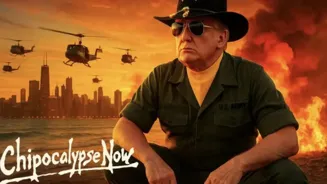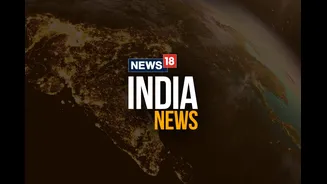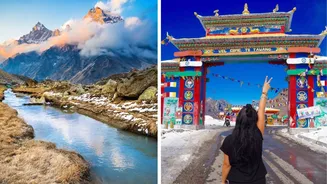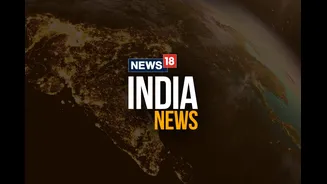US President Trump on Sunday attempted to downplay his social media post where he threatened an "apocalypse" in the city of Chicago. Speaking to reporters
before he departed the White House for the US Open, Trump addressed his post from Saturday in which he invoked his newly rebranded name for the Pentagon, now known as the 'Department of War', with an image that included helicopters, flames and the Chicago skyline. On Sunday, when asked whether he was "threatening to go to war with Chicago," Trump called it "fake news," and chastised the reporter when she asked why he would use the Department of Defence. "We're not going to war, we're going to clean up our cities," Trump said. "We're going to clean them up so they don't kill five people every weekend. That's not war. That’s common sense." In his post on Truth Social, Trump had written, "Chicago about to find out why it's called the Department of WAR". He also shared an AI-generated parody image on social media with the caption "Chipocalypse Now" - a reference to the 1979 war movie "Apocalypse Now.” Also Read: Suspected Immigration Raids, Military Base Support Called - Is Trump Planning To Take Over Chicago?
Big crackdown in Chicago?
The Trump administration has reached out to a military base near Chicago for assistance with immigration operations, indicating a massive potential crackdown in the city. Expanding the law enforcement crackdown in the nation's third-largest city, the Department of Homeland Security has asked Naval Station Great Lakes for support in the form of facilities, infrastructure, and other logistical needs related to DHS operations.
Trump has often singled out Chicago, likening it to a war zone and "hellhole." In recent statements, his administration has been pointing out recent shootings in the city, including at Thursday's White House press briefing, when press secretary Karoline Leavitt listed crime statistics.
Although details of the administration's plans for Chicago are scarce, city leaders said they are preparing for multiple possible scenarios, from troops assisting in immigration arrests to patrolling in the streets. Workers were also circulating know-your-rights cards in neighbourhoods with heavy immigrant populations, they said.














